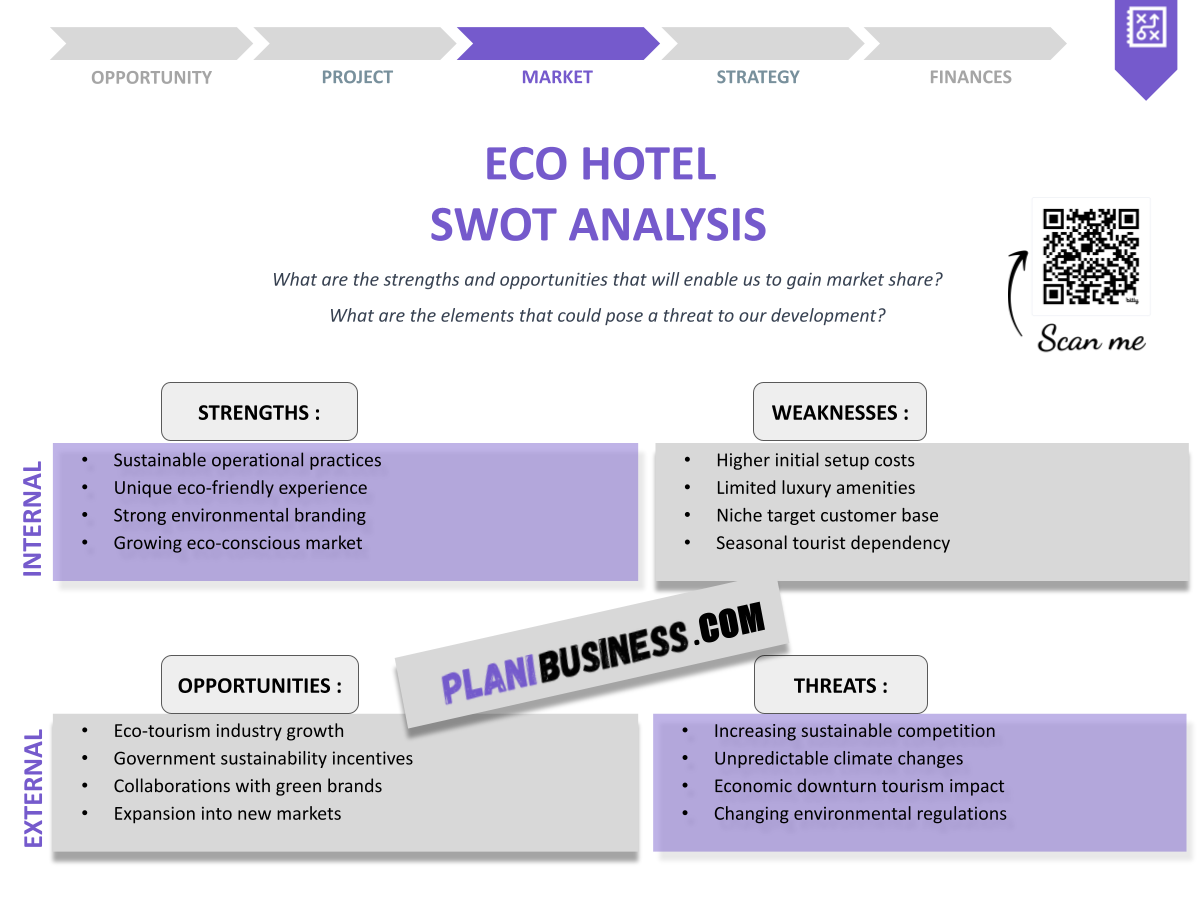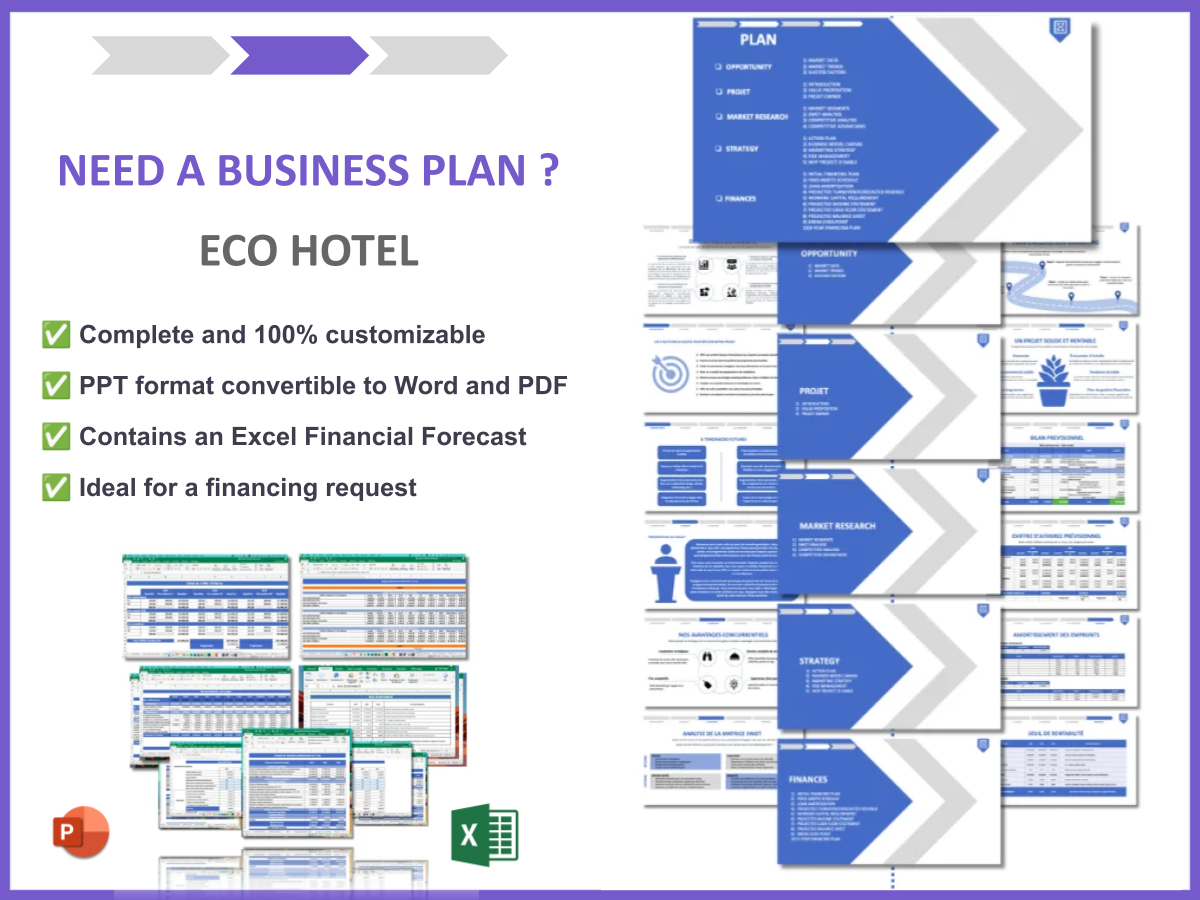Why Should You Have a SWOT Analysis for Eco Hotels?
Are you thinking about starting an eco hotel? You’re not alone! With the rise of sustainable tourism, many entrepreneurs are venturing into eco-friendly accommodations. But, before you dive in, have you considered a SWOT analysis for your eco hotel? This simple yet powerful tool can help you identify your strengths, weaknesses, opportunities, and threats, guiding your strategy and ensuring success in a competitive market. A SWOT analysis is a strategic planning technique that allows businesses to assess internal and external factors that can impact their operations.
Here are 10 compelling reasons why you should conduct a SWOT analysis for your eco hotel:
- Understand the significance of SWOT analysis for eco hotels.
- Learn how to write a comprehensive SWOT analysis.
- Explore 10 inspiring examples of eco hotel SWOT analyses.
- Identify common strengths of eco hotels.
- Recognize weaknesses that may hinder success.
- Discover potential opportunities in the eco tourism market.
- Be aware of threats facing eco hotels.
- Gain practical insights to improve your eco hotel business.
- Learn how to apply these examples to your own strategy.
- Get answers to frequently asked questions about SWOT analysis.
How Do You Write a SWOT Analysis for Eco Hotels?
Crafting a SWOT analysis for your eco hotel requires a structured approach. Start by gathering your team and brainstorming each of the four components: strengths, weaknesses, opportunities, and threats. Consider both internal factors, like your hotel’s unique features, and external factors, such as market trends. Here’s a breakdown to help you get started:
Strengths
One strength could be your commitment to sustainability, which attracts eco-conscious travelers. Another strength might be your location, providing easy access to nature and outdoor activities. You may also have partnerships with local businesses that enhance guest experiences. Lastly, exceptional customer service can set you apart from competitors.
Weaknesses
A common weakness for eco hotels is higher operational costs due to sustainable practices. Limited marketing budgets can hinder visibility in a crowded market. Seasonal fluctuations in tourism may affect your revenue. You may also face challenges in sourcing eco-friendly materials consistently.
Opportunities
The growing trend of eco-tourism presents a significant opportunity for eco hotels. Collaborating with local environmental organizations can enhance your brand image. Implementing innovative technologies can improve efficiency and guest experiences. Expanding your services to include wellness programs can attract a broader audience.
Threats
Increasing competition from traditional hotels adopting green practices poses a threat. Economic downturns can lead to decreased travel budgets for consumers. Regulatory changes regarding environmental practices may impact operations. Negative reviews or social media backlash can harm your reputation.
SWOT Example N°1 for Eco Hotel
In this example, we’ll analyze an eco hotel that specializes in organic farm-to-table dining. This unique approach not only attracts guests but also aligns with their sustainability mission, emphasizing the importance of local sourcing and environmental responsibility.
| SWOT | Analysis |
|---|---|
| Strengths | Unique dining experience that showcases local organic produce. |
| Weaknesses | High cost of organic ingredients may reduce profit margins. |
| Opportunities | Growing demand for sustainable dining experiences among travelers. |
| Threats | Competition from budget hotels offering lower-priced dining options. |
- Unique selling proposition in dining.
- High operational costs due to organic sourcing.
- Expanding market for sustainable food experiences.
- Budget hotels increasing competition in the dining sector.
This eco hotel’s focus on organic food not only attracts guests but also aligns with their sustainability mission. However, managing costs while maintaining quality can be challenging. It's essential for the hotel to find a balance between offering exceptional dining experiences and ensuring profitability.
SWOT Example N°2 for Eco Hotel
This example focuses on an eco hotel located near a national park, emphasizing outdoor adventures and eco-friendly activities for guests. This positioning leverages the natural environment to attract eco-conscious travelers seeking unique experiences.
| SWOT | Analysis |
|---|---|
| Strengths | Proximity to natural attractions enhances guest experiences. |
| Weaknesses | Seasonal business fluctuations may lead to inconsistent revenue. |
| Opportunities | Partnerships with local tour operators can enhance offerings. |
| Threats | Environmental regulations affecting outdoor activities. |
- Great location for adventure seekers.
- Revenue dips in off-peak seasons can affect financial stability.
- Collaborations with local businesses can boost visibility and revenue.
- Regulatory changes may impact available activities.
Leveraging local partnerships can boost visibility and revenue for this eco hotel, but seasonal changes require strategic planning to maintain profitability. Emphasizing eco-friendly activities will appeal to the target audience while ensuring compliance with local regulations.
SWOT Example N°3 for Eco Hotel
This example looks at a boutique eco hotel that emphasizes community engagement and supports local artisans. By integrating local culture and products into their offerings, this hotel enhances the guest experience while promoting sustainability.
| SWOT | Analysis |
|---|---|
| Strengths | Strong community ties foster loyalty and repeat business. |
| Weaknesses | Limited marketing reach may hinder attracting new guests. |
| Opportunities | Community events can attract more visitors and promote local culture. |
| Threats | Competing hotels with larger marketing budgets may overshadow efforts. |
- Community involvement boosts guest loyalty.
- Marketing challenges limit visibility to potential customers.
- Hosting events can draw new guests and increase occupancy.
- Larger hotels pose a threat with their extensive marketing resources.
This eco hotel’s focus on community engagement fosters loyalty, but without effective marketing, the hotel may struggle to reach potential guests. Developing a robust marketing strategy that highlights community initiatives could significantly enhance visibility.
SWOT Example N°4 for Eco Hotel
This example features an eco hotel that prioritizes renewable energy sources, such as solar panels and wind turbines, to power its operations. This commitment not only reduces the hotel’s carbon footprint but also appeals to environmentally conscious travelers.
| SWOT | Analysis |
|---|---|
| Strengths | Energy-efficient operations lead to cost savings over time. |
| Weaknesses | High initial investment costs may deter potential investors. |
| Opportunities | Government incentives for renewable energy can offset costs. |
| Threats | Fluctuating energy prices can impact long-term budgeting. |
- Cost savings from energy-efficient practices.
- High upfront costs can deter investment in renewable technologies.
- Incentives available for implementing green energy solutions.
- Energy price volatility can complicate financial planning.
While renewable energy presents long-term savings for this eco hotel, the initial costs can be a barrier for some. It’s crucial to explore available government incentives and create a financial plan that accommodates potential energy price fluctuations.
SWOT Example N°5 for Eco Hotel
Here, we analyze an eco hotel that offers wellness retreats and spa services, catering to health-conscious travelers looking for relaxation and rejuvenation in a sustainable environment. This hotel focuses on providing holistic experiences that align with the values of its guests.
| SWOT | Analysis |
|---|---|
| Strengths | Unique wellness offerings differentiate it from competitors. |
| Weaknesses | High competition in the wellness market can dilute brand identity. |
| Opportunities | Rising interest in health and wellness among travelers presents a growing market. |
| Threats | Economic downturns may lead to reduced spending on luxury services. |
- Distinctive wellness programs attract a niche audience.
- Intense competition in the wellness sector requires clear branding.
- Growing market for health-conscious travel provides expansion opportunities.
- Luxury spending may decline during economic challenges.
The wellness trend is booming, but standing out in a crowded market can be tough without a clear value proposition. This eco hotel must continually innovate its offerings to meet the evolving demands of health-conscious travelers.
SWOT Example N°6 for Eco Hotel
This example covers an eco hotel that focuses on educational experiences related to sustainability, offering workshops and programs that engage guests in environmental conservation efforts. This approach not only informs guests but also enhances their overall experience.
| SWOT | Analysis |
|---|---|
| Strengths | Educational programs attract families and environmentally conscious guests. |
| Weaknesses | Limited appeal to guests seeking traditional vacation experiences. |
| Opportunities | Collaborations with schools and educational organizations can expand reach. |
| Threats | Changes in educational funding could impact program availability. |
- Family-friendly educational experiences create lasting memories.
- Niche market appeal may limit potential guest demographics.
- Partnerships with educational institutions can drive new bookings.
- Funding cuts could threaten program sustainability.
This eco hotel’s focus on educational offerings can be a unique draw, but targeting the right audience is essential for maximizing occupancy. By enhancing partnerships and ensuring program viability, this hotel can thrive in the competitive eco tourism market.
SWOT Example N°7 for Eco Hotel
This example highlights an eco hotel that integrates local culture and heritage into its offerings, providing guests with authentic experiences that celebrate the surrounding community. By focusing on cultural immersion, this hotel appeals to travelers seeking meaningful connections during their stay.
| SWOT | Analysis |
|---|---|
| Strengths | Authentic cultural experiences create a unique selling proposition. |
| Weaknesses | Niche market appeal may limit broader audience reach. |
| Opportunities | Increasing interest in cultural tourism can drive bookings. |
| Threats | Global travel restrictions can deter international guests. |
- Unique cultural offerings attract niche markets.
- Limited audience base may restrict revenue potential.
- Interest in cultural tourism is on the rise.
- Travel restrictions could significantly impact guest numbers.
While cultural experiences can attract niche markets, unforeseen global events can significantly impact bookings. This eco hotel should develop strategies to diversify its offerings and appeal to a broader audience while maintaining its cultural focus.
SWOT Example N°8 for Eco Hotel
This example analyzes an eco hotel that offers unique accommodations, such as treehouses or yurts, providing guests with memorable lodging experiences in nature. This distinctive approach not only enhances the guest experience but also aligns with eco-friendly practices.
| SWOT | Analysis |
|---|---|
| Strengths | Distinctive lodging options attract adventure-seeking travelers. |
| Weaknesses | Limited capacity may restrict potential revenue. |
| Opportunities | Growing trend for unique stays can increase market demand. |
| Threats | Weather-related cancellations can affect occupancy rates. |
- Unique accommodations create a strong competitive advantage.
- Capacity limitations may hinder revenue growth.
- Rising interest in unique lodging experiences can drive bookings.
- Adverse weather conditions can impact guest comfort and bookings.
Unique accommodations can be a major draw for this eco hotel, but operational challenges, especially during bad weather, need to be addressed. Developing a robust marketing strategy that emphasizes the unique nature of the lodging will be essential to attract guests.
SWOT Example N°9 for Eco Hotel
This example looks at an eco hotel that integrates technology for sustainability, utilizing smart systems and eco-friendly practices to enhance operations and guest experiences. This forward-thinking approach appeals to tech-savvy travelers who prioritize sustainability.
| SWOT | Analysis |
|---|---|
| Strengths | Innovative use of technology enhances operational efficiency. |
| Weaknesses | High costs of technology implementation may deter investment. |
| Opportunities | Tech-savvy travelers seeking eco-friendly options represent a growing market. |
| Threats | Rapid technological advancements can lead to obsolescence. |
- Cutting-edge technology for sustainability attracts a niche audience.
- Implementation costs can be significant and may impact profitability.
- Growing demand for eco-friendly technology among travelers.
- Keeping up with technological advancements requires ongoing investment.
Technology can enhance sustainability efforts for this eco hotel, but staying current with advancements is crucial for maintaining a competitive edge. Developing a clear strategy for technology investment will be essential to capitalize on this opportunity.
SWOT Example N°10 for Eco Hotel
This example analyzes an eco hotel that incorporates local art and artisans into its design and operations, creating a unique atmosphere that reflects the community’s culture. This approach not only supports local artists but also enhances the guest experience.
| SWOT | Analysis |
|---|---|
| Strengths | Support for local artists enhances community ties and guest experience. |
| Weaknesses | Limited scalability may hinder expansion opportunities. |
| Opportunities | Growing interest in local culture can attract more visitors. |
| Threats | Changes in the local economy could affect the availability of art and artists. |
- Community support through art creates a unique atmosphere.
- Scalability issues may restrict growth potential.
- Increasing interest in local culture provides expansion opportunities.
- Economic changes can impact local artists and art availability.
Supporting local artists creates a unique atmosphere for this eco hotel, but ensuring financial sustainability is vital for long-term success. By developing strong community ties and promoting local culture, this hotel can enhance its appeal in the eco tourism market.
Conclusion
In conclusion, conducting a SWOT analysis for your eco hotel is an invaluable step toward understanding your position in the competitive landscape of sustainable tourism. By identifying your strengths, weaknesses, opportunities, and threats, you can make informed decisions that will drive your business forward. Whether you’re focusing on unique accommodations, community engagement, or eco-friendly practices, each aspect of your hotel can benefit from a thorough analysis.
For those looking to develop a comprehensive strategy, consider utilizing a business plan template for Eco Hotel that can guide you through the process. Additionally, you can explore our articles on How to Develop an Eco Hotel? and How to Launch an Eco Hotel Marketing Plan? With Example to further enhance your understanding and planning.
FAQ
What is a SWOT analysis?
A SWOT analysis is a strategic tool used to identify and evaluate the strengths, weaknesses, opportunities, and threats facing a business.
Why is a SWOT analysis important for eco hotels?
It helps eco hotels understand their market position and develop strategies to leverage their strengths while addressing challenges.
How frequently should I conduct a SWOT analysis?
It’s beneficial to perform a SWOT analysis annually or whenever significant changes occur in the market or within your hotel.
Can I apply SWOT analysis to other types of businesses?
Yes! A SWOT analysis is applicable to any business, providing valuable insights into its strategic position.
What are common strengths for eco hotels?
Common strengths include a commitment to sustainability, unique location advantages, and strong partnerships with local businesses.
What weaknesses do eco hotels typically face?
Common weaknesses may involve high operational costs due to sustainable practices and limited marketing budgets.
How can I identify opportunities for my eco hotel?
Look for market trends, collaborations, and emerging customer interests in sustainable tourism and eco-friendly experiences.
What threats should I be aware of?
Be mindful of increasing competition, economic downturns that affect travel budgets, and regulatory changes regarding environmental practices.
Can I use examples from this article for my own SWOT analysis?
Absolutely! Use these examples as inspiration to tailor your own SWOT analysis based on your unique business context.
How can I implement the findings from my SWOT analysis?
Develop an action plan that leverages your strengths, addresses your weaknesses, capitalizes on opportunities, and mitigates threats.







